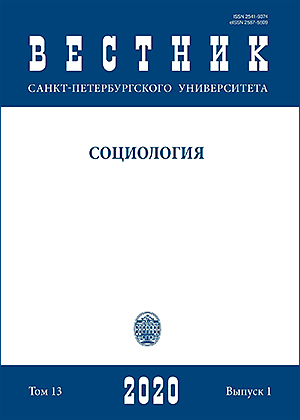Компьютерная пропаганда: структурные характеристики и векторы исследования
DOI:
https://doi.org/10.21638/spbu12.2020.105Аннотация
Термин «компьютерная пропаганда» появился несколько лет назад и сформировался на пересечении целого ряда наук — компьютерных наук, политологии, социологии, лингвистики, социальной психологии и др. В связи с тем, что внимание к данному феномену актуализируется по причинам не только технологического, но и социетального характера, авторы ставят своей целью выявить и проанализировать основные векторы формирования теоретического концепта компьютерной пропаганды с позиций социокоммуникативного подхода. Для этого были определены основные структурные характеристики концепта, соответствующие характеристикам процесса информационного воздействия (объект пропаганды, формы, каналы, субъекты пропаганды). С этих позиций был рассмотрен исходный концепт пропаганды, представленный в классических трудах по данной тематике, а также выявлена специфика нового понятия компьютерной пропаганды. Особенности объекта компьютерной пропаганды связывают с новыми характеристиками целевой аудитории — сегментированной структуры сетевых виртуальных сообществ, обладающих свойством некритичного восприятия «удобной и привычной» информации. Новой формой компьютерной пропаганды является целенаправленно конструируемая и циркулирующая в социальных сетях фейковая информация. Новым способом (каналом) распространения такой информации выступают социальные боты — алгоритмизированные программы, позволяющие осуществить распространение с максимальной скоростью и масштабностью. Субъектами компьютерной пропаганды являются новые политические и бизнес-элиты, объединившие свои усилия с представителями технологической элиты. Показано, что в настоящее время доминирует негативная коннотация в трактовке компьютерной пропаганды как коммуникативной практики использования новых компьютерных технологий для манипуляции и дезинформации в онлайн-пространстве. Обозначены возможные перспективы проблематики, связанные с осмыслением более широкого (нейтрально-информационного) контекста в понимании феномена компьютерной пропаганды.
Ключевые слова:
пропаганда, объект и субъект пропаганды, фейки, социальные боты
Скачивания
Библиографические ссылки
References
Загрузки
Опубликован
Как цитировать
Выпуск
Раздел
Лицензия
Статьи журнала «Вестник Санкт-Петербургского университета. Социология» находятся в открытом доступе и распространяются в соответствии с условиями Лицензионного Договора с Санкт-Петербургским государственным университетом, который бесплатно предоставляет авторам неограниченное распространение и самостоятельное архивирование.




